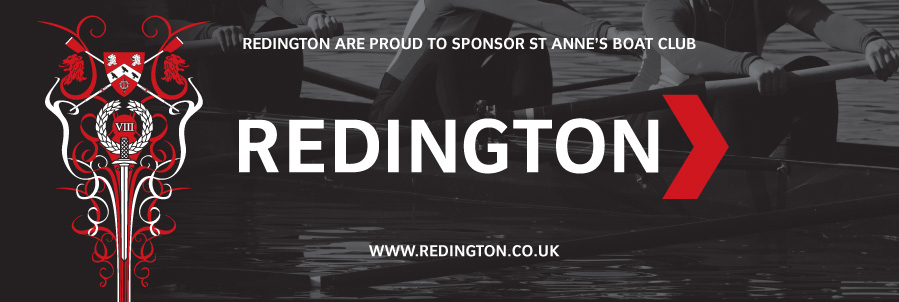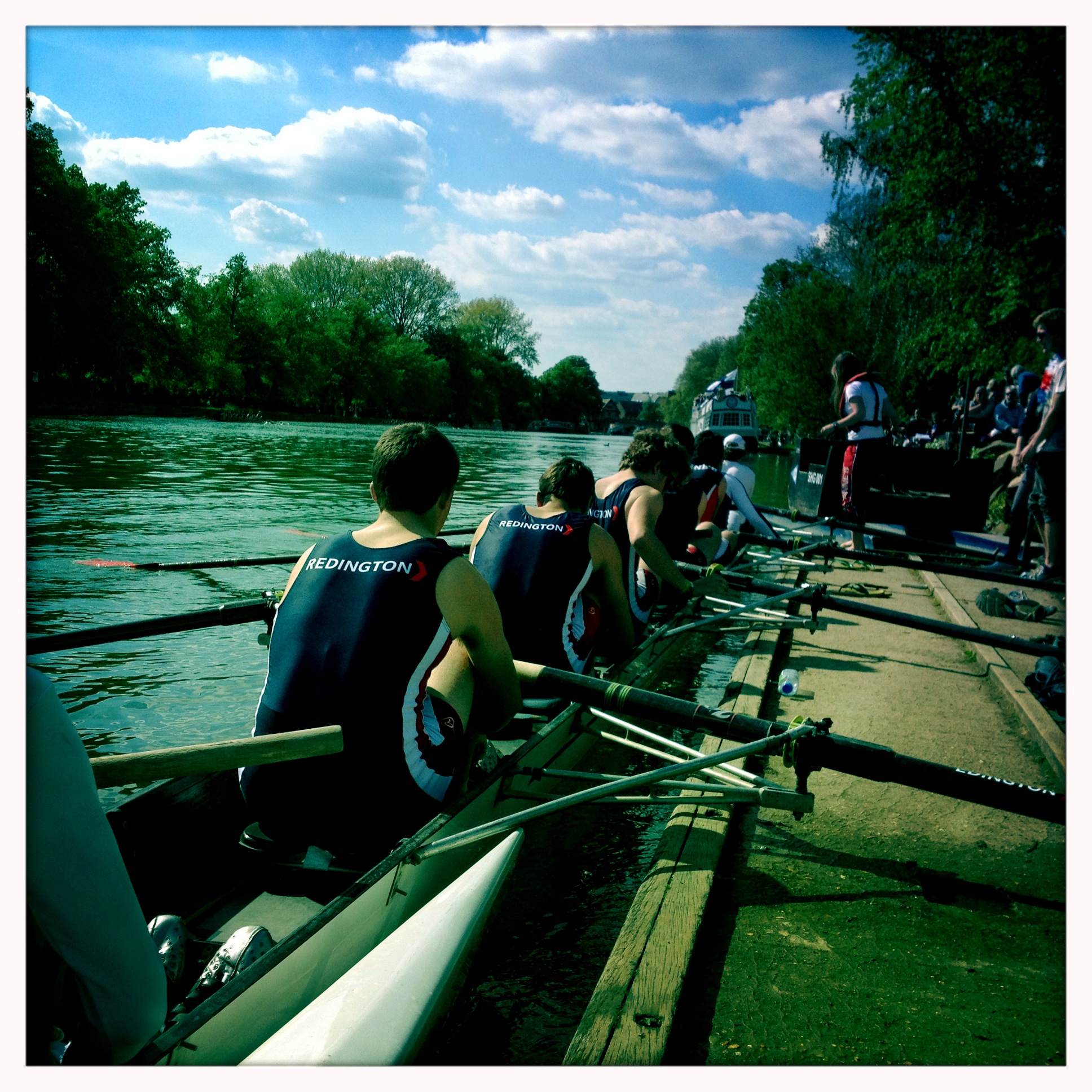Last Saturday 25th May 2013 I was in Oxford for Summer VIII’s – the annual inter collegiate rowing regatta of bumps racing. I was there to support St Anne’s Boat Club “SABC”, my former boat club (1997 to 2000) now supported by Redington. Watching the joy of bumping and the agony of being bumped I reflected on why rowers do what they do, and what lessons they learn doing their sport that prepare them for life after university.
“If you’re not nervous at the start of a bumps race then nothing in life will scare you!”
– Eddie Rolls former Captain of the SABC Men’s 1st VIII (M1)
Rowers love racing. As Jenni Allen rower and cox for the Women’s 1st VIII (W1) from 2003 to 2006 describes it “That awesome feeling in a head race when you inch past another crew, taking them down one seat at a time”. But it’s not just about racing for Naomi Tyler, Women’s Captain of SABC “it’s the serene sound of a boat running smooth through the water as the sun rises over Oxford”
Below are 15 reasons why rowers make great graduates
1. PURPOSE: Rowers achieve the feeling of togetherness that comes about as a result working hard as a team for a common goal: Hannah Morris, SABC President, describes this common goal as “the fact that the crew has to be so united in every way – how they row, think and work together – and their success relies on full commitment from everyone involved.”
2. INDIVIDUAL COMMITMENT WITH TEAM COMMITMENT: Rowing requires absolute attention to individual performance, while balancing that with an overarching commitment to the team and its goals. As Tino (Valentin) Sulzer, Men’s Captain of SABC, describes it “(rowing is) individual in that you work on your own technique and fitness, but when you get into a boat you have to learn to row with eight other people” Ivan Soto-Wright, former SABC M1 rower and now Redington investment consultant, describes the SABC team camaraderie as “working together to win as a team. You might have a fast 2,000m time or believe that you can feather that blade into the catch better than anyone else, but if your timing is off and you can’t row in time with your crew on the water… then you can catch a crab and your whole team pays the price”. Eddie describes rowing for SABC M1 as “You live as a team, or you die as individuals”
3. PREPARATION AND TRAINING: Rowers know that, although passion is important, nothing beats preparation and training. Tino knows “that success is directly proportional to how much work he puts in and knowing that makes winning feel even sweeter!”
4. AMBITION: Every rower is desperate to achieve success. Mediocrity won’t suffice.
5. PAIN AND DISCIPLINE: All SABC rowers face that eternal choice: the pain of discipline versus the pain of regret. Training is hard. Try getting out of bed, sometimes with a hangover, at 5:30am to ride to the boat house in rain, sleet, and snow only to discover that the river is frozen over and you can’t row. However, all SABC rowers know the pain of discipline is worth it when you win or bump!
6. HUMILITY: During racing and bumps, sometimes the result can be unfair or simply disappointing. But you just have to pick yourself up and move on. For Ivan, nothing teaches humility better than the ergometer rowing machine or “erg”. “The erg always wins, there is always a bit more you can give”.
7. CONTINUOUS IMPROVEMENT, MARGINAL GAINS: SABC rowers learn the importance of continuous improvement and marginal gains in the pursuit of mastering their stroke or rowing in perfect time with each other. Success doesn’t come immediately, on call, as planned, but gradually and as it is earned.
8. KNOWLEDGE OF THE BODY AND ITS LIMITATIONS: Rowers and sports people best know how far the body can really be pushed and what amazing feats it can achieve when it is stressed. Equally, those who have stressed their bodies to such lengths understand its limitations and see warning signs earlier. Jenni Allen notes “you can’t expect top performance when you’re cold, wet, tired, and hungry” and Matt Ridley M1 rower knows “exercise is fun and being fit feels amazing!”.
9. MINDSET CONTROL: Rowers must push themselves further and harder than many other people think is possible or healthy. Jonathan Williams, M1, has learned that there are “multiple pain thresholds” to be overcome. Rowers see thresholds, while many others see limits.
10. TIME MANAGEMENT: In order to find time to fit in hours of training each day on top of the hours of studying that every other student finds taxing on its own, a rower must be a master of time management. Kasia Bera, W1, balances a full time degree with 12 rowing sessions a week. Naomi prioritises her time to the areas that will have the most gain.
11. PERSONAL REWARD: Rowers row for personal reward. Success is hard got, and there’s no pat on the back from someone else, no money and not much glory involved. That respect for and value of private satisfaction is hard learned outside sport.
12. MAKING AND ACCEPTING EXECUTIVE DECISIONS: Everything is about what makes the boat go faster. Only the best team will get the bump – hesitating in making a decision, selecting someone based on the wrong but valid criteria like effort or position instead of pure skill, making decisions ruled by emotion rather than calculation can all damage a crew’s chances. Coaches and captains must realise this and crews must accept it.
13. TRUST: Captains or coxes also learn that “It’s easier to motivate a crew that trusts you!” Trust provides the foundational strength of the team to work towards a common goal.
14. PLANNING: Things go best when rowers have a plan. But as Fennel Letts, M1 cox and Captain of Coxes, knows “it’s only worth having a plan if you’re willing to adapt it when necessary.”
15. LONG TERMISM: Rowers understand that nothing comes immediately. Success is not dependent on one’s talking or stated goals, or the pressure applied by someone else, but comes with quiet, diligent, hard work and patience. Setbacks must be learned from, and overcome, so as not to jeopardise future success.
Armed, on graduation, with these fifteen traits, what rower can fail? What business could fail when it employs a good number of them? A master of these disciplines is a master of people, of teams and of businesses.
SABC continues to grow, recruit more novice winners, field more boats, win more races, get more bumps, win blades and make progress up the race divisions. Good luck SABC both as rowers and as tomorrow’s graduates.
This is why Redington proudly supports St Anne’s Boat Club.



Reblogged this on St Anne's Boat Club and commented:
Some thoughts about how rowing prepares you for life after university by Robert Gardner, co-CEO of our sponsor Redington. A truly fascinating read, and full of promise for the futures of all SABC rowers!
A good comment in Cherwell this week – “rowers never stop”
Reblogged this on The Vision of the Pension Plowman and commented:
Spot on Rob! They make great mates too!
Exploring reddit.com I noticed your site book-marked as: 15 Reasons why
rowers make great graduates | Robert Gardner. Now I am
assuming you book marked it yourself and wanted to ask if social book-marking gets you
a ton of visitors? I’ve been considering doing some bookmarking for a few of my websites but wasn’t certain
if it would yield any positive results. Thank you.
Heya are using WordPress for your blog platform?
I’m new to the blog world but I’m trying to get started and set up my own.
Do you require any html coding expertise to make your
own blog? Any help would be really appreciated!
no you don’t – i am a complete novice user
And here are several reasons why rowers don’t make good employees:
1) They can only take one action, which they do repeatedly.
2) They can’t change direction. Someone has to do it for them.
3) They only work when someone shouts at them.
4) The captain turns their back on rest of team.
5) Team selection is heavily biased against nine stone weaklings.
On balance, I’d give them all a miss if I were you, Rob!